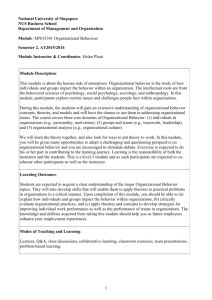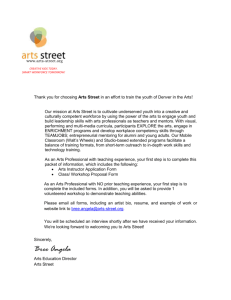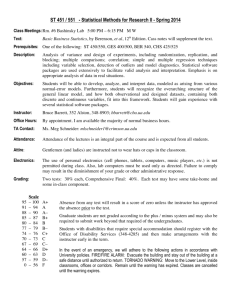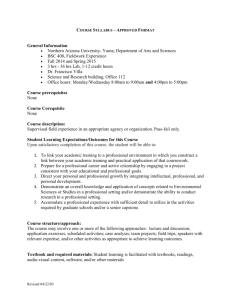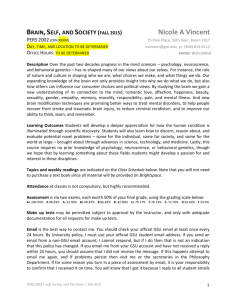Intro to Studio - James O'Donnell's Art
advertisement
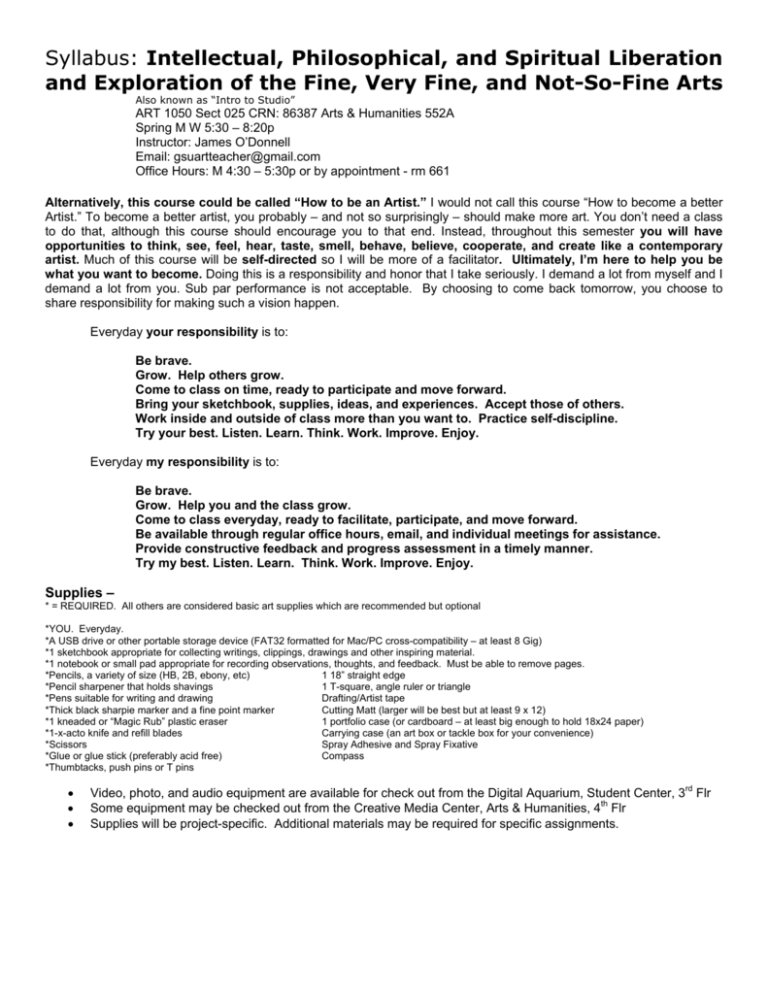
Syllabus: Intellectual, Philosophical, and Spiritual Liberation and Exploration of the Fine, Very Fine, and Not-So-Fine Arts Also known as “Intro to Studio” ART 1050 Sect 025 CRN: 86387 Arts & Humanities 552A Spring M W 5:30 – 8:20p Instructor: James O’Donnell Email: gsuartteacher@gmail.com Office Hours: M 4:30 – 5:30p or by appointment - rm 661 Alternatively, this course could be called “How to be an Artist.” I would not call this course “How to become a better Artist.” To become a better artist, you probably – and not so surprisingly – should make more art. You don’t need a class to do that, although this course should encourage you to that end. Instead, throughout this semester you will have opportunities to think, see, feel, hear, taste, smell, behave, believe, cooperate, and create like a contemporary artist. Much of this course will be self-directed so I will be more of a facilitator. Ultimately, I’m here to help you be what you want to become. Doing this is a responsibility and honor that I take seriously. I demand a lot from myself and I demand a lot from you. Sub par performance is not acceptable. By choosing to come back tomorrow, you choose to share responsibility for making such a vision happen. Everyday your responsibility is to: Be brave. Grow. Help others grow. Come to class on time, ready to participate and move forward. Bring your sketchbook, supplies, ideas, and experiences. Accept those of others. Work inside and outside of class more than you want to. Practice self-discipline. Try your best. Listen. Learn. Think. Work. Improve. Enjoy. Everyday my responsibility is to: Be brave. Grow. Help you and the class grow. Come to class everyday, ready to facilitate, participate, and move forward. Be available through regular office hours, email, and individual meetings for assistance. Provide constructive feedback and progress assessment in a timely manner. Try my best. Listen. Learn. Think. Work. Improve. Enjoy. Supplies – * = REQUIRED. All others are considered basic art supplies which are recommended but optional *YOU. Everyday. *A USB drive or other portable storage device (FAT32 formatted for Mac/PC cross-compatibility – at least 8 Gig) *1 sketchbook appropriate for collecting writings, clippings, drawings and other inspiring material. *1 notebook or small pad appropriate for recording observations, thoughts, and feedback. Must be able to remove pages. *Pencils, a variety of size (HB, 2B, ebony, etc) 1 18” straight edge *Pencil sharpener that holds shavings 1 T-square, angle ruler or triangle *Pens suitable for writing and drawing Drafting/Artist tape *Thick black sharpie marker and a fine point marker Cutting Matt (larger will be best but at least 9 x 12) *1 kneaded or “Magic Rub” plastic eraser 1 portfolio case (or cardboard – at least big enough to hold 18x24 paper) *1-x-acto knife and refill blades Carrying case (an art box or tackle box for your convenience) *Scissors Spray Adhesive and Spray Fixative *Glue or glue stick (preferably acid free) Compass *Thumbtacks, push pins or T pins • • • Video, photo, and audio equipment are available for check out from the Digital Aquarium, Student Center, 3rd Flr Some equipment may be checked out from the Creative Media Center, Arts & Humanities, 4th Flr Supplies will be project-specific. Additional materials may be required for specific assignments. Course Outline – (“The best laid plans…” - course syllabus provides a general plan; deviations may be necessary.) • • • • • • • • • • Project 1: 25 Variations of an Object 8/29 Project 2: Artist Research Presentation 9/7 & 9/12 Project 3: Artist Mash-up 9/26 Project 4: Mind Map (“Who Am I?”) 10/10 Project 5: Collaborative Installation 10/26 Project 6: Performance / Non-object 11/14 Project 7: Sketchbook 11/30 Project 8: New Media / Technology 12/5 Project 9: Class Adventure* TBA Class Art Exhibition ??? *Every student will be responsible for leading the class in a 15 – 30 min adventure during a class period sometime this semester. Experiences can include teaching a skill, leading a discussion, playing a game, or anything that you think may interest your colleagues. Depending on weather and instructor approval, it may be possible to meet or travel off-campus. Try to engage the entire class and encourage participation. Grading – • • • • • • Your grade will be based on the number of checkmarks you collect. You may collect an unlimited number of checkmarks. It is possible to receive checkmark bonuses throughout the semester. Some exercises and projects are worth more checks than others. In most cases, a single exercise or project can receive checkmarks in multiple categories. Only attendance is mandatory, but nothing is optional either. For your final grade, checkmarks will be converted to the plus/minus grading system as follows: -250+ = A 225+ = B 200+ = C 150+ = D 149 and below = F • Work will be assessed via written and oral feedback from the class. Individual assignment grades are not given. • If you’re unclear about anything, ask. Late or Unsatisfactory Work – Late work is unappreciated. It may not be acceptable in the “real world,” but this is school, not the “real world.” Late work may not receive full credit. Unfinished or unsatisfactory work will need to be completed or redone for credit. Attendance – Department Policy: Attendance at every class meeting is mandatory and role is taken at the beginning and end of each class. Classes begin at stated times and lateness is unacceptable. Leaving early or arriving late is counted as a half-absence. Your final grade will essentially be reduced by one letter grade for each absence after the third absence. There are no “excused” absences; therefore, it would be wise to save your 3 allowable absences in anticipation of emergencies. If you are late to class, it is your responsibility to notify me after class that you were late and to request a change in the attendance record. If you fail to do this, be aware that your attendance record for that day may remain as an absence. It is your responsibility to inform me in advance of a class that you know you must miss. You will be held responsible for the materials covered in the missed class and must consult with your fellow students to receive all missed information. Calendar Late Registration – Aug 22 – 26 Holiday (Labor Day) – Sept 5 Midpoint – Oct 7 (Last Day to Withdraw) Thanksgiving Break – Nov 21 – 26 Classes End – Dec 5 Final Exams – Dec 6 – 13 FYI: 1. Cell phone use during class is rude. This includes texting. Emergencies only. Please TURN OFF / IGNORE! 2. Head phones / ear buds are fine while working independently. 3. Food & drink are fine. Litter is not. Leave trash and lose food privilege. 4. Come back from break promptly. This includes smokers. Chronically long breaks may result in penalty. 5. If you disagree, be agreeable, at all times respectful, in the way you disagree. 6. Share your problems with me, personal or otherwise, privately and immediately, please. ***After completing this course, please complete an online course evaluation. Your feedback improves the class and my teaching. Thank you!*** University Policies Withdrawals Be advised that the last day to withdraw from this course with the possibility of receiving a ‘W’ is semester midpoint (see above). If a student withdraws by this date but is failing the course, he or she will receive a ‘WF.’ Any student who withdraws after this date will receive a ‘WF.’ Students are allowed to withdraw with a grade of “W” a maximum of six times in their undergraduate careers at Georgia State. Please see http://www.gsu.edu/es/withdrawal_from_classes.html for further details. Academic Honesty Policy Georgia State University, as part of the academic community, expects students to recognize and uphold standards of intellectual and academic integrity. A basic and minimum standard of conduct in academic matters is required of students, which mandates that they be honest and submit for credit only the products of their own efforts. Both the ideals of scholarship and the need for practices that are fair require that all dishonest work be rejected as a basis for academic credit. They also require that students refrain from any and all forms of dishonorable conduct in the course of their academic work. The definitions presented below are intended to clarify for the instructor the standards by which academic honesty and academically honorable conduct may be judged. This list is not exhaustive; however these examples may be used to illustrate to students the standards of behavior expected of them by the University. Plagiarism: Plagiarism is presenting another person’s work as one’s own. It includes any paraphrasing or summarizing of the works of another person without acknowledgment, including the submitting of another student’s work as one’s own. Plagiarism frequently involves a failure to acknowledge in the text, notes, or footnotes the quotation of paragraphs, sentences, or even a few phrases written or spoken by someone else. The submission of research completed papers or projects prepared by someone else or the use of research sources gathered by someone else when forbidden by the instructor is considered plagiarism. Failure to acknowledge the extent and nature of one’s reliance on other sources is also a form of plagiarism. Other forms may be unique to an individual discipline or assignment. The student is responsible for understanding the conditions under which plagiarism may occur and the consequences of such action. Cheating on Examinations: Cheating on examinations involves giving or receiving unauthorized help before, during or after an examination. This may include the use of notes, text, or "crib sheets" during an examination (unless approved by the instructor), or sharing information with another student during an examination. Other examples include intentionally allowing another student to view one’s own examination and collaboration before or after an exam if such is forbidden by the instructor. Unauthorized Collaboration: Submission for academic credit of a work product, or a part thereof, represented as being one’s own effort, which has been developed in substantial collaboration with or without assistance from another person or source, (or to provide such assistance) is a violation of academic honesty. Falsification: It is a violation of academic honesty to misrepresent material or fabricate information in an academic exercise or assignment. Multiple Submissions: It is a violation to submit substantial portions of the same work for credit more than once without the explicit consent of the instructor(s) to whom the material is submitted. In cases of cumulative work or in a sequence of courses, use of prior work may be desirable or required, therefore the student is responsible for indicating in writing that the work is cumulative in nature. Members of the academic community, including part-time instructors, are expected to report suspected violations of the standards of academic conduct. Accommodations for students with disabilities Georgia State University complies with Section 504 of the Rehabilitation Act and the Americans with Disabilities Act. Students with disabilities who seek academic accommodations must first take appropriate documentation to the Office of Disability Services locate in Suite 230 of the New Student Center. This office provides evaluation of individual needs, advisement and appropriate support for academic programs of identified persons with disabilities. In addition, the Office of Disability Services coordinates special parking needs and provides testing facilities and proctoring to students with special needs. Please advise your instructor if you have a documented disability that needs to be accommodated. You may wish to visit the ODS website at http://www.gsu.edu/disability for more information. Security Statement Georgia State University and the Welch School of Art have installed punch code locks to make our buildings safer for students and faculty. You should treat any lab or studio under card lock as a secure space. As such, GSU and the Welch School ask that you abide by the following guidelines to help ensure the safety and wellbeing of everyone: 1. ALWAYS have your GSU ID card with you when on campus. 2. NEVER allow anyone to use your card. If a student or member of the staff or faculty is authorized to be in the area, their cards will give them access. If anyone asks you for your card, report the incident to campus police. 3. ALWAYS report suspicious people or activity to the faculty or graduate student in charge of the studio or lab. If, for any reason, there is no faculty or graduate student supervision, report suspicious people or activity to campus police. The number is 404-413-2100. 4. NEVER try to enter a studio or lab by “piggybacking” on someone else. For example: if someone is entering the lab or studio before you, do not try to get through the door while it is open. Wait for the door to close and then punch in again to gain entry. Similarly, do not allow someone else to come through with you. It can be tempting to hold the door open for someone whose hands are full with equipment, etc. This practice, however, is NOT SECURE and can put everyone at risk. Wanting to help is good, but be smart about it. If you want to help a classmate or friend who is carrying a lot of equipment you can, 1) gain entry to the lab or studio by yourself, 2) wait on the other side of the door for the other person to enter, and 3) help the person with her/his equipment. These procedures are a course requirement and the consequences for violating them range from penalties to your course grade to expulsion from the class. Security is everyone’s concern. GSU and the Welch School of Art and Design thank you in advance for your cooperation.
